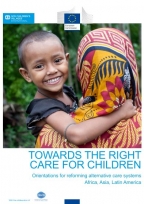Supporting Teachers With Mobile Technology: Lessons Drawn From UNESCO Projects in Mexico, Nigeria, Senegal and Pakistan

Drawing on the importance of highly qualified teachers and on the high levels of teacher shortages, countries must consider how they can improve both the quantity and quality of their teacher workforce, including in contexts where infrastructure is limited, poverty is widespread and crisis and conflict are realities. Solving the twin challenges of teacher supply and teacher quality will require time and investment. It will also require innovation and a willingness to experiment and confront problems with new tools and approaches. When considering different ‘outside the box’ strategies to bring teacher development to scale at minimal cost, especially in poor countries, UNESCO kept returning to a simple but increasingly prevalent technology: mobile phones.
This publication concerns UNESCO’s attempt to fill this gap and pilot projects to help in-service teachers who are not often reached by standard capacity development initiatives. While the UNESCO projects did not target pre-service teachers, they shine light on practices that would benefit teachers preparing to enter classrooms as well as those who are already working. The chapters present what was attempted where, why and to what result. UNESCO’s aim was to both test an overarching concept—can mobile technology support professional development?—and understand, at a local level, what elements contribute to the success and failure of individual projects implemented in unique contexts. To do this, pilot projects were carried out in four different countries, using four different designs and targeting four different beneficiary groups. This diverse project portfolio helped UNESCO probe the strengths and limitations of different solutions deployed in real-world settings. What follows is an account of lessons learned and a description of how UNESCO’s approaches might be employed elsewhere.
Authors: Publication:UNESCO
Year of Publication:2017
unesdoc.unesco.org


